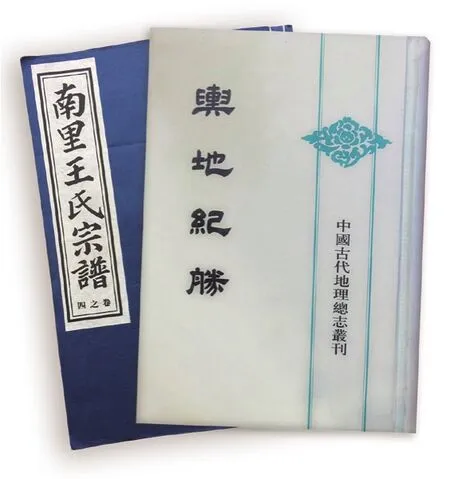《舆地纪胜》:宋代地志“百科全书”
2022-09-26潘江涛
文/ 潘江涛

金华磐安。傅君良/摄An aerial view of Pan’an county, Jinhua city. Photo by Fu Junliang.
浙江是中国闻名的“方志之乡”。历史上,浙江方志名家辈出,方志名作迭现。
金华诗人许梦熊撰写的《与王象之书》(2021年6月,杭州出版社)是一部长诗集,是一位80后青年写给800年前的地理学家王象之的;也是以现代诗的名义,完成对古人的一次对话与致敬。
王象之:仕宦子弟的舆地志趣
王象之(1163—1230), 名熺,字仪父,南宋婺州金华(今属浙江磐安)人,系王羲之后裔。其父王师古(一曰王师亶),绍兴二十四年(1154)进士,官历南剑州(治今福建南平市)州学教授、袁州宜春县(今江西宜春县)主簿、知江州(治今江西九江市)及广东提点刑狱。兄弟七人,象之行五,叔兄王益之著有《本汉年纪》,见识超卓。
王象之是幸运的,仕宦之家的优越家境给了他饱读四书五经、遍览秀丽山水、评品地方风物的便利,也激发了他从事舆地之学的强烈愿望。他在《舆地纪胜》自序中说:“余少侍先君宦游四方,江、淮、荆、闽,靡国不到,独恨未能执简操牍以纪其胜。”他还跟随“仲兄行甫(即兵马副都监王炳),四至锦城,而叔兄中甫(即诗人王奕,有《卧龙堂记集》传世)北趋武兴,南渡渝泸,归来道梁、益事,皆衮衮可听,然求西州图记于箧中藏,未能一二。”
地方志,古称地志、地记、图经、方志等,是全面系统地记述一定区域自然、社会和人文的历史与现状的资料性文献,具有“资治、存史、教化”等多重功能,自古即有“治天下者以史为鉴,治郡国者以志为鉴”的思想。
王象之所处的时代,《元和郡县志》《元丰九域志》《太平寰宇记》《舆地广记》等地理文献,不可谓不多,但都不过是“辨古今,析同异,考山川之形势,稽南北之离合”,至若“收拾山川之精华以借助笔端,取之无禁,用之不竭,使骚人才士于一寓目之倾,而山川具若效奇于左右,则未见其书”。也就是说,上述种种地理文献多为经世济邦而写。王象之决定编撰一本不那么“有用”的地志,让“骚人士才”开卷而尽得一郡名物,“以资词人学士歌咏文字之用”。
难怪,800多年后,金华青年诗人许梦熊在细读了南宋大量文献以及近人的研究后,直言王象之的志趣恰是中国著名美学家宗白华(1897—1986)所说的“不沾滞于物的自由精神,这是一种心灵的美,或哲学的美”。
许梦熊说:“这是一种彬彬有礼的风度。‘风雅的人是真正的生活’,即使他们的事迹只剩下吉光片羽,也仍然让我们追慕不已。”
《舆地纪胜》:远超前人地志研究
较之于其他地志,《舆地纪胜》有诸多独到之处。譬如,在编纂体例上,每郡自为一编,以郡之溯源为编首,诸邑次之,郡之风俗又次之,起到了“承上启下,继往开来”的作用,“地理总志的编纂才真正走上了规范化道路”。而在内容采集时,《舆地纪胜》对郡中山川之英华、人物之奇杰、吏治之循良、方言之异同、故老之传记,以及诗章文辞之有关风土者,莫不摘其要而记之。尤其是将诗和骈体文作为独立类目来注释一地之风俗景物,可谓地理书中的首创。与此同时,王象之还把一般地志中的山水、井泉、亭台、楼阁、佛寺、道观等内容悉数收入“景物”门类,并对重要地名渊源作了注释。

以挖掘金华磐安县尚湖镇著名历史人物王象之为主题的诗集《与王象之书》,作者许梦熊。A Letter to Wang Xiangzhi, written by Jinhua poet Xu Mengxiong, is a collection of long poems about Wang Xiangzhi, a geographer during the Southern Song dynasty (1127-1279).
研究者认为,其“学识之博,收拾之富,考究之精,会萃之勤”,无出其右,《舆地纪胜》亦因此被后人誉为“南宋地志的‘百科全书’”。
“百科全书”的客观真实权威性主要来自王象之的治学严谨,凡200卷“皆身所见所闻也,不则宁缺如焉。”
据雍正年间《东阳县志》记载,王象之“志行高洁,隐居不仕”。庆元元年(1195年),王象之进士及第,但并未步入仕途,而是回到老家,青灯黄卷,孜孜矻矻,夜以继日地分析比较。仅“建康卷”,王象之参考的书目就达59种。一旦发现疑问,他便学“昔太史公上会稽探禹穴”之法,迈开脚步,实地踏勘,收获颇丰。
譬如,在“起临安,讫龙州”之南疆碑记中,王象之便纠正了前朝名人的不少谬误。如原镇江丹徒《梁太祖文皇神碑》,他考证后确认是中兴初年梁武帝之父作的《成都府殿柱记》。又如《嘉定府移水记》,他实地考证后知其非郭璞所书。他还考察了台州临海庆恩院、定光院、明智院和婺州义乌的真如院诸碑,以及福州乌石《宣威感应王庙碑》等碑文,发现皆书有“会同”二字,证明了五代期间的吴越之地曾使用契丹年号。
研究认为,绍定六年间(1229—1233),王象之将《舆地纪胜》定稿付梓,从绍定二年起前后花费近30年时间,可谓倾注半生心血。
王象之未曾立传,也不知终于何官,王象之其个人故事,如同历史迷雾中的一个影子。《宋史》中没有关于他的记载,地方文献语焉不详。初识王象之是在十五年前,一个偶然的机会,我获赠一套中华书局再次重印的6卷本《舆地纪胜》,却不适应木刻竖排、繁体字、文言文、没有任何标点的文本,读来如同蚂蚁搬家—费劲。
有一天,我上网浏览,忽然发现四川大学历史文学院博士生导师李勇先是研究《舆地纪胜》的专家,并有这方面的专著,便立即去电讨教,李导师的热情让我感动。凭着他的研究成果,我加深了对王象之及其《舆地纪胜》的理解和领会。
我们现在读到的《舆地纪胜》已经佚失包括婺州、温州、衢州、处州等31卷,这不能不说是件憾事。不过,尽管内容残缺不全,其学术价值仍然不容置疑。正如著名历史地理学家、教育家邹逸麟在《〈舆地纪胜〉的流传及其价值》一文中说:“王象之写此书的目的非仅限于佐人笔端而已……其学术价值不仅远远超过与其体裁相仿的《方舆胜览》,而且不低于此前的四部总志,某些方面可以说有过之而无不及。”
李勇先也认为,“无论就内容的详实该洽还是史实的可靠性方面,都远远超过了以前的《地理志》和地理总志,代表了南宋以前历代疆域政区沿革研究的最高水平”。
Highlights in the Land: An Encyclopedia of Geographical Records in the Song Dynasty
By Pan Jiangtao
Zhejiang is known as the “Hometown of Local Gazetteer” in China.(Hangzhou Publishing House,2021), written by Jinhua poet Xu Mengxiong, is a collection of long poems about a geographer 800 years ago.
Wang Xiangzhi (1163-1230), a native of Jinhua (known as Wuzhou at the time, and present-day Pan’an county, Zhejiang),was a descendant of Wang Xizhi (303-361), the Chinese calligraphy sage. His father Wang Shigu served as a scholarly official. Wang Xiangzhi was fortunate, well-read, well-traveled, and the local scenery inspired his strong desire to engage in the study of geography. There were many geographical documents then,all written for the economic world, so Wang Xiangzhi decided to compile a book for the use of lyricists and scholars. No wonder,more than 800 years later, the young poet Xu Mengxiong of Jinhua, after a careful reading, bluntly stated that Wang Xiangzhi’s interest was exactly what Zong Baihua (1897-1986), a famous Chinese aesthetician, said, “The free spirit aspired for a kind of spiritual beauty, or philosophical beauty.” Xu said: “Elegant people are the real life, even if their deeds are forgotten.”
Wang’sis unique as an encyclopedia of geography: it includes description of beautiful mountains and rivers,distinguished people, officials, different dialects, biographies, and relevant customs noted in the poems and prose. In particular, the use of poetry and parallel prose as an independent category to annotate the customs and scenery of a place can be said to be thefirst of its kind in geography books. At the same time, Wang Xiangzhi also included all the landscapes, wells, springs, pavilions, Buddhist and Taoist temples, etc. in the general topography into the “scenery”category, and made notes on the origin of important place names.

《南里王氏宗谱》有王象之的记载,《舆地纪胜》由王象之编纂而成。Highlights in the Land was written by Wang Xiangzhi,who was recorded in the family’s genealogy book.
Researchers believe that his knowledge, research, and collection were unparalleled, and his works were praised by later generations as “the encyclopedia of the Southern Song geography”.The objective and authentic authority of the “encyclopedia” mainly came from Wang’s rigorous scholarship. All his 200 volumes “are all that I have seen and heard, otherwise it would be better to be absent.” According to the,Wang “was noble in his conduct, and he lived in seclusion and did not serve as an official”, but it was not the case. In 1195, Wang Xiangzhi passed the imperial exam with honors, but he returned to his hometown. In the “Jiankang Volume” alone, he referenced 59 bibliographies. Once he found doubts, he followed the method of Sima Qian (206 BC-220 AD) the master historian,investigated on the spot, and gained a lot. For example, Wang corrected many of the mistakes of prominentfigures in the previous dynasty. Research shows that between 1229 and 1233, Wang Xiangzhi put theto print after 30 years of hard work.
Wang never had a biography left, and there is no record of him in the. Fifteen years ago,I received a set of six-volumereprinted by Zhonghua Book Company, but one day, while browsing the internet, I suddenly found that Professor Li Yongxian at Sichuan University was an expert on this and had a monograph on this subject, so I got in touch with him. Thewe read now is incomplete with 31 original volumes about Wuzhou,Wenzhou, Quzhou, Chuzhou missing. However, its academic value is still unquestionable. Famous historical geographer and educator Zou Yilin said in his paper, “Wang Xiangzhi’s purpose in writing this book is not limited to assisting people’s writing .... Its academic value is as good as anything in the same genre.” Professor Li Yongxian also thought very highly of the.
“Hometown of Local Gazetteer” is a new paradigm of cultural inheritance. Every place retains the common memory of a group of people, with their taste of life, the feelings of the hometown, the experience of life, and the continuation of the story.
